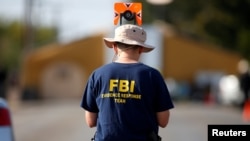The FBI has yet to gain access to data on Devin Kelley's phone four days after the former airman killed 26 churchgoers in Texas in the deadliest mass shooting in the state's history, Deputy Attorney General Rod Rosenstein said Thursday, blaming "warrant-proof encryption" for impeding criminal investigations.
The FBI's San Antonio office sent Kelley's encrypted phone to the bureau's crime lab in Quantico, Virginia, earlier this week after agents were unable to unlock it, Christopher Combs, the special agent in charge of the FBI's office in San Antonio, Texas, said Tuesday.
But Rosenstein, speaking at the BWI Business partnership organization in Maryland, said the FBI has been unable to access "the data inside because of encryption."
"Nobody has a legitimate privacy interest in that phone," Rosenstein said. "The suspect is deceased. Even if he were alive, it would be legal for police and prosecutors to find out what is in the phone."
The FBI declined to say whether the bureau had been able to unlock the phone but unable to access its encrypted data.
Kelley killed 26 people and injured 20 others at a church in Sutherland Springs, Texas, on Sunday before turning the gun on himself.
The FBI has not identified the make or model of Kelley's phone, but the Associated Press reported on Wednesday that it was an Apple iPhone.
Apple said on Wednesday that it "immediately" reached out to the FBI after "learning that investigators were trying to access a mobile phone."
"We offered assistance and said we'd expedite our response to any legal process they send us," Apple said in a statement.
Legal battle
Rosenstein said "strong encryption is good," but he criticized technology companies for building devices and applications that make it difficult for law enforcement authorities even with a warrant to access encrypted data.
A 2016 legal dispute between the FBI and Apple over the bureau's effort to gain access to the phone of San Bernardino mass shooter Syed Rizwan Farok fueled a national debate over privacy and public safety.
The FBI obtained a warrant to unlock the phone, but the data was encrypted and Apple refused to help the bureau gain access to the data.
The showdown ended after the FBI was able to open the device with the use of an unnamed third party.
FBI officials have long expressed frustration over increasingly sophisticated encryption technology that makes it harder for law enforcement to access devices and data.
In the first 11 months of the 2017 fiscal year, the FBI was unable to access the content of nearly 7,000 smartphones, more than half the total number of devices the bureau tried to access, FBI Director Christopher Wray said last week.
"And that's a huge, huge problem," Wray said. "It impacts investigations across the board — narcotics, human trafficking, counterterrorism, counterintelligence, gangs, organized crime and child exploitation."





